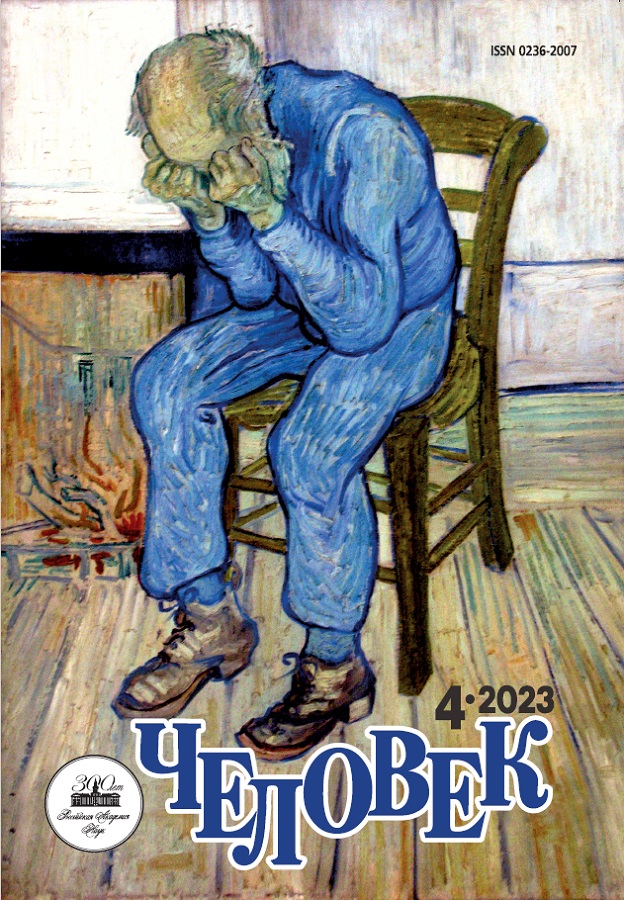Индивидуальные и коллективные измерения морального стресса
- Авторы: Сычев А.А.1,2
-
Учреждения:
- Национальный исследовательский Мордовский государственный университет им. Н.П. Огарева
- Тюменский индустриальный университет
- Выпуск: Том 34, № 4 (2023)
- Страницы: 170-180
- Раздел: Символы. Ценности. Идеалы.
- URL: https://kazanmedjournal.ru/0236-2007/article/view/670687
- DOI: https://doi.org/10.31857/S023620070027359-1
- ID: 670687
Цитировать
Полный текст
Аннотация
Статья посвящена моральному стрессу, который понимается как совокупность эмоциональных реакций на вызовы, угрожающие целостности системы нравственных норм и ценностей, а также как состояние, возникающее в результате такого воздействия. Индивидуальные измерения морального стресса раскрываются в обзоре концептов морального дистресса и моральной травмы. На примере «моральной эластичности» проанализированы подходы к преодолению морального стресса, которые предполагают изменение отношения субъекта к факторам стресса. Показано, что эти подходы являются закономерными проявлениями терапевтического поворота в культуре. Отмечается усиление влияния стрессовых факторов на жизнь общества. Если в прошлом проявления морального стресса были чрезвычайными и персонифицированными, то в современности они приобретают привычный характер и коллективное измерение. Причина этого — увеличивающийся разрыв между разнонаправленными системами ценностей, в центре одной из которых находится достижение индивидуального благополучия, а второй — эффективное регулирование социального целого. С одной стороны, увеличение этого разрыва связано с расширением пространства индивидуальной свободы, с другой — с чрезвычайными условиями борьбы с терроризмом, пандемией и т.д., практика регуляции которых требует ограничения личных прав. Прослеживаются несколько коллективных стратегий избавления от морального стресса. Стратегии приспособления обозначены как морализация и интеллектуализация. Третья стратегия, предполагающая отстаивание индивидуального благополучия, выражена в виде явлений, ассоциируемых с «новой этикой». Делается вывод, что для преодоления морального стресса необходима рациональная стратегия отстаивания убеждений, направленная не только на внутренние, но и на структурные изменения. Для этого предлагается дополнить психологическую трактовку индивидуального морального стресса широкими междисциплинарными обобщениям по поводу его социальных причин и коллективных проявлений.
Об авторах
Андрей Анатольевич Сычев
Национальный исследовательский Мордовский государственный университет им. Н.П. Огарева; Тюменский индустриальный университетРоссийская Федерация, Республика Мордовия, 430005 Саранск, ул. Большевистская, д. 68; Российская Федерация, 625000 Тюмень, ул. Володарского, д. 38
Список литературы
- Апресян Р.Г. К базовому определению морали // Философский журнал. 2014. №1 (12). С. 78–91.
- Бадью А. Этика: Очерк о сознании Зла. СПб.: Machina, 2006.
- Гегель Г.В.Ф. Эстетика. В 4 т. Т. 4. М.: Искусство, 1978.
- Кадыров Р.В., Дмитриева О.Б. Моральная травма: современные подходы к определению понятия, этиологии, диагностике и психотерапии // Вестник КемГУ. 2021. №2 (86). С. 438–446.
- Мак-Вильямс Н. Психоаналитическая диагностика: Понимание структуры личности в клиническом процессе. М.: Класс, 2001.
- Макинтайр А. После добродетели: Исследования теории морали. М.: Академический Проект, 2000.
- Маркузе Г. Эрос и цивилизация. Киев: ИСА, 1995.
- Ноздрачев Д. И., Замятин К. А., Мирошниченко М. Д. Моральный дистресс в паллиативной помощи детям: классические проблемы и вызовы пандемии COVID-19 // Человек. 2022. T. 33. № 3. C. 138–158.
- Сериков А.Е. Стресс и этика самообладания // Mixtura verborum: философский ежегодник. Самара: СГА, 2015. С. 20–39.
- Смолева Е.О. Социальный стресс и стратегии его преодоления: анализ концепций и моделей // Социальное пространство. 2020. Т. 6. № 3. С. 1–13.
- Штомпка П. Социальное изменение как травма (статья первая) // Социс. 2001. № 1. С. 6–16.
- Bartone P. Resilience under military operational stress: can leaders influence hardiness? Military Psychology. 2006. Vol. 18. P. 131–148.
- Carlson J., Haffenden R., Bassett G. Resilience: Theory and Application. Argonne: Argonne National Library, 2012.
- Frezza E. E. The moral distress syndrome affecting physicians: how current healthcare is putting doctors and patients at risk. New York: Routledge, 2021.
- Griffin B. J., Purcell.N., Burkman K. Moral Injury: An Integrative Review. Journal of Traumatic Stress. 2019. Vol. 32. Issue 3. P. 350–362.
- Jameton A. Nursing Practice: The Ethical Issues. Englewood Cliffs: Prentice-Hall, 1984.
- Jones-Bonofiglio K. Health Care Ethics through the Lens of Moral Distress. London: Springer, 2020.
- Litz B. T., Stein N., Delaney E. Moral injury and moral repair in war veterans: A preliminary model and intervention strategy. Clinical Psychology Review. 2009. Vol. 29. P. 695–706.
- Moral distress and moral injury – recognising and tackling it for UK doctors. London: BMA, 2021.
- O’Brien T. The Things They Carried. New York: Viking Penguin, 1990.
- Rushton C. H. Moral Resilience: A Capacity for Navigating Moral Distress in Critical Care. AACN Advanced Critical Care. 2016. Vol. 27. N 1. P. 111–119.
- Shay J. Achilles in Vietnam. New York: Atheneum, 1994.
- Shay J. Moral injury. Psychoanalytic Psychology. 2014. Vol. 31(2). P. 182–191.
- Webster G., Baylis F. E. Moral residue. Margin of error: The ethics of mistakes in the practice of medicine. Hagerstown: University Publishing Group, 2000. P. 217–230.
Дополнительные файлы











